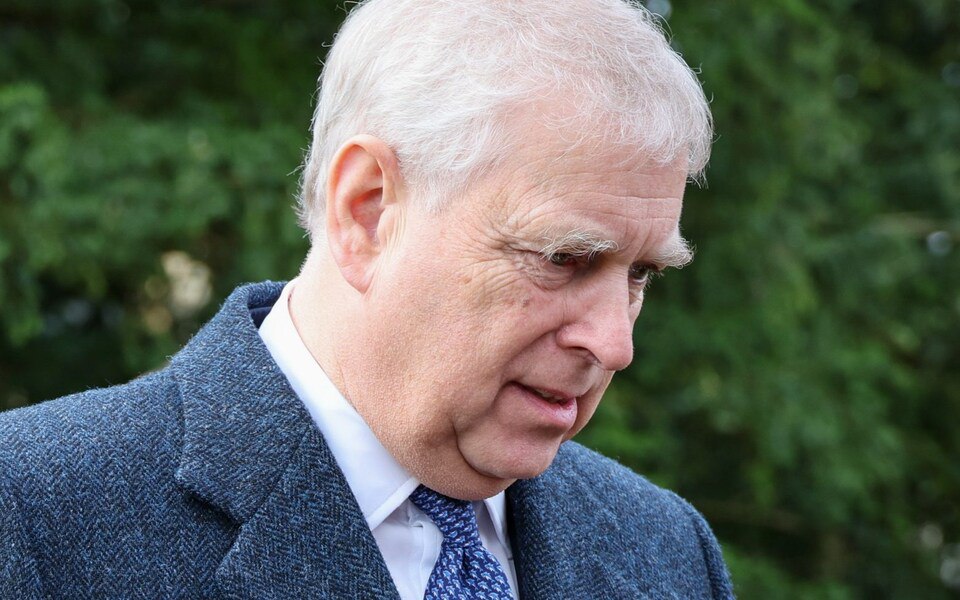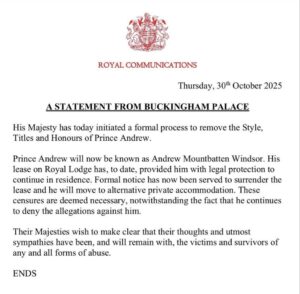Why did King Charles strip Prince Andrew of his title and mansion in unprecedented Royal shake-up? What does it mean for the Royal Family?

Prince Andrew leaves Royal Lodge after losing title and mansion. Image Source: Sprinter press/X
In a historic move that has rocked Buckingham Palace, King Charles III has stripped his brother, Prince Andrew, of his royal title and ordered him to vacate Royal Lodge, his 30-room Windsor mansion. The decision, described by palace insiders as “unprecedented,” follows renewed outrage over Andrew’s ties to convicted sex offender Jeffrey Epstein and fresh allegations resurfaced in Virginia Giuffre’s posthumous memoir.
Andrew, who will now be known as Andrew Mountbatten Windsor, has consistently denied all allegations of sexual misconduct. However, the King’s action signals a definitive break from years of royal silence surrounding one of the monarchy’s most controversial figures.
The Palace Statement: A Final Blow to a Troubled Prince
Buckingham Palace released the statement at 7 p.m. on Thursday, confirming the removal of Andrew’s princely status and announcing that he will relocate to Sandringham Estate in Norfolk. The statement emphasized the King’s commitment to victims, noting that “Their Majesties’ thoughts and sympathies remain with victims and survivors of all forms of abuse.”

This marks the end of Andrew’s official association with royal titles including Duke of York, Earl of Inverness, and Baron Killyleagh, along with honorary orders such as the Order of the Garter.
Royal historian Kate Williams told CNN the move was “unprecedented,” calling it “a decisive act to protect the integrity of the monarchy itself.”
READ ALSO
Giuffre’s Family: ‘She Brought Down a British Prince’
The family of Virginia Giuffre, who accused Andrew of sexual abuse as a teenager, described the King’s decision as “a victory unlike any other.” Her brother, Sky Roberts, told BBC Newsnight, “Our sister took down a prince. We’re proud of her, but this can’t end here, there must be further investigation.”
Giuffre tragically took her own life earlier this year, but her memoir reignited calls for accountability and exposed what many see as years of royal protectionism. Epstein survivor Annie Farmer told the BBC, “Virginia did what most thought impossible. She showed the world even the most powerful can be held accountable.”
A Rare Moment in British Royal History
According to BBC’s Dominic Casciani, the last time a royal lost their princely title was over a century ago, when Ernest Augustus was stripped for siding with Germany during World War I. Andrew’s case, however, stems not from treason but from “serious lapses of judgment,” as palace officials phrased it.
Historians note this decision sets a precedent for how the monarchy handles internal scandals moving forward, especially those involving allegations of abuse or misconduct.
Political and Public Reaction: A Divided Nation
Across Britain, reactions have been swift and mixed. Conservative leader Kemi Badenoch praised the King’s “courage to act against his own brother,” while Liberal Democrat leader Ed Davey called it “a vital step toward restoring trust in British institutions.”
However, campaigners like Graham Smith of the Republic movement say, “Losing titles isn’t justice. Andrew must face real accountability.”
Meanwhile, locals near Windsor Great Park, where Andrew lived for over 20 years, told BBC reporters they felt “it was long overdue.” One pubgoer remarked, “He deserves it. I can’t even look at him.”
What’s Next for Andrew Mountbatten Windsor
Andrew will relocate to a smaller property within the Sandringham Estate, funded privately by the King. His ex-wife Sarah Ferguson, who shared the Royal Lodge, is expected to make new living arrangements.
Though stripped of royal status, Andrew remains eighth in line to the throne, a technicality many critics say should be addressed next.
As the royal family braces for continuing scrutiny, one thing is clear: this is a new era of accountability for the monarchy, with no royal figure seemingly beyond reproach.
FAQ
1. Why did King Charles strip Prince Andrew of his title?
King Charles removed Prince Andrew’s royal title due to growing public pressure and renewed outrage over his association with Jeffrey Epstein, following the release of Virginia Giuffre’s memoir. The decision was made to protect the monarchy’s reputation.
2. What will Prince Andrew be called now?
Prince Andrew will now be known as Andrew Mountbatten Windsor, his family surname combining the names of the late Queen Elizabeth II and Prince Philip.
3. Where will Prince Andrew live after leaving Royal Lodge?
He will move to a smaller residence on the Sandringham Estate in Norfolk, privately funded by King Charles.
4. Did Prince Andrew admit to any wrongdoing?
No. Andrew has consistently denied all allegations of sexual misconduct involving Virginia Giuffre and others connected to Jeffrey Epstein.
5. What was Virginia Giuffre’s connection to Prince Andrew?
Virginia Giuffre alleged she was trafficked by Jeffrey Epstein and forced to have sex with Andrew on three occasions as a teenager. Andrew has always denied these claims.
6. Has any royal ever lost their title before?
Yes, but it’s extremely rare. The last was Ernest Augustus in 1919 for supporting Germany in World War I. Andrew’s case is the first modern instance tied to scandal, not politics.
7. Will Prince Andrew face criminal charges?
There are no current criminal proceedings against Andrew, though Virginia Giuffre’s family and campaigners are calling for further investigation.
8. How has the public reacted to King Charles’s decision?
Public response has been largely supportive, with many praising the King’s decisive action. However, critics argue symbolic gestures aren’t enough without legal accountability.
9. Do Princess Beatrice and Eugenie still have titles?
Yes. Andrew’s daughters retain their royal titles as Princesses under the 1917 Letters Patent issued by King George V.
10. What does this mean for the future of the monarchy?
The move marks a turning point for the royal family, showing King Charles’s willingness to uphold accountability, even within his own family, to preserve public trust.

